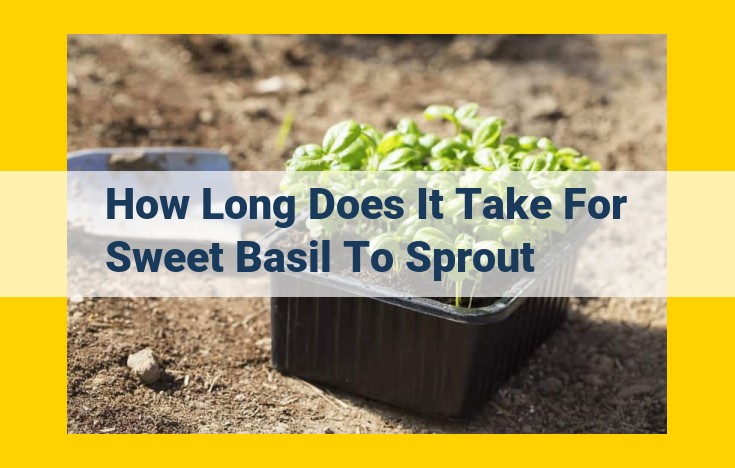Sweet basil seeds typically take 5-10 days to sprout under optimal conditions. These conditions include a temperature range of 65-75°F, regular watering to maintain moist but not soggy soil, and planting seeds about ¼ inch deep and spaced adequately apart. Ideal soil type is well-drained and rich in organic matter. Heat mats and humidity domes can enhance germination by providing bottom heat and a humid environment. Fresh, mature, and disease-free seeds increase germination rates.
Environmental Conditions for Successful Basil Seed Germination
Basil, a beloved herb in culinary adventures, requires specific environmental conditions to thrive from seed to lush plant. Understanding these factors is essential for successful germination and a bountiful basil harvest.
Temperature and Moisture
Basil seeds revel in warm temperatures between 70-85°F (21-29°C). Consistent warmth is crucial, as fluctuations can hinder germination. Regular watering is vital, avoiding soggy conditions that suffocate seeds and dry spells that prevent their absorption of water. Maintaining moist but not saturated soil is key.
Optimal Depth and Spacing
Planting seeds at the correct depth is paramount. For basil seeds, ¼-½ inch (0.6-1.3 cm) is ideal, allowing for adequate moisture absorption without hindering growth. Proper spacing between seedlings ensures sufficient airflow, preventing overcrowding and promoting healthy development.
Seed Starting Mix and Heat Mats
A well-draining seed starting mix provides the ideal foundation for basil seeds. It should be light and airy, encouraging proper root growth. Heat mats are an invaluable tool, offering bottom heat that stimulates germination, especially in cooler temperatures.
Humidity Domes
Humidity domes create a humid environment that mimics the natural conditions basil seeds encounter during germination. They help retain moisture around the seeds, preventing them from drying out and increasing their chances of success.
Additional Factors Impacting Basil Seed Germination
Seed Maturity, Freshness, and Health
Mature seeds have higher germination rates than immature ones. Fresh seeds are also preferable, losing viability over time. Disease-free seeds are essential to prevent seedling diseases that can jeopardize your basil plants.
Additional Factors Impacting Basil Seed Germination
In addition to the environmental conditions discussed above, there are other crucial factors that influence the successful germination of basil seeds. These factors include:
Seed Maturity
Using mature seeds is paramount for optimal germination rates. Immature seeds often lack viability and may struggle to germinate or produce weak seedlings. To ensure successful germination, it is important to source seeds from reputable suppliers or harvest them from fully developed basil plants.
Seed Freshness
Freshness plays a significant role in seed viability. As seeds age, their germination rate generally declines. Therefore, it is advisable to use basil seeds within a year of harvesting or purchase fresh seeds from reliable retailers. Fresh seeds are more likely to germinate vigorously and produce healthy seedlings.
Disease-Free Seeds
It is crucial to use disease-free seeds to prevent the introduction of pathogens into your garden. Seeds can harbor various diseases that can compromise seedling health and lead to stunted growth or wilting. To minimize the risk of disease transmission, it is recommended to purchase certified disease-free seeds from reputable sources or practice proper seed disinfection techniques before planting.
